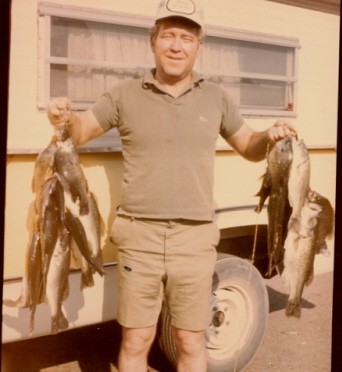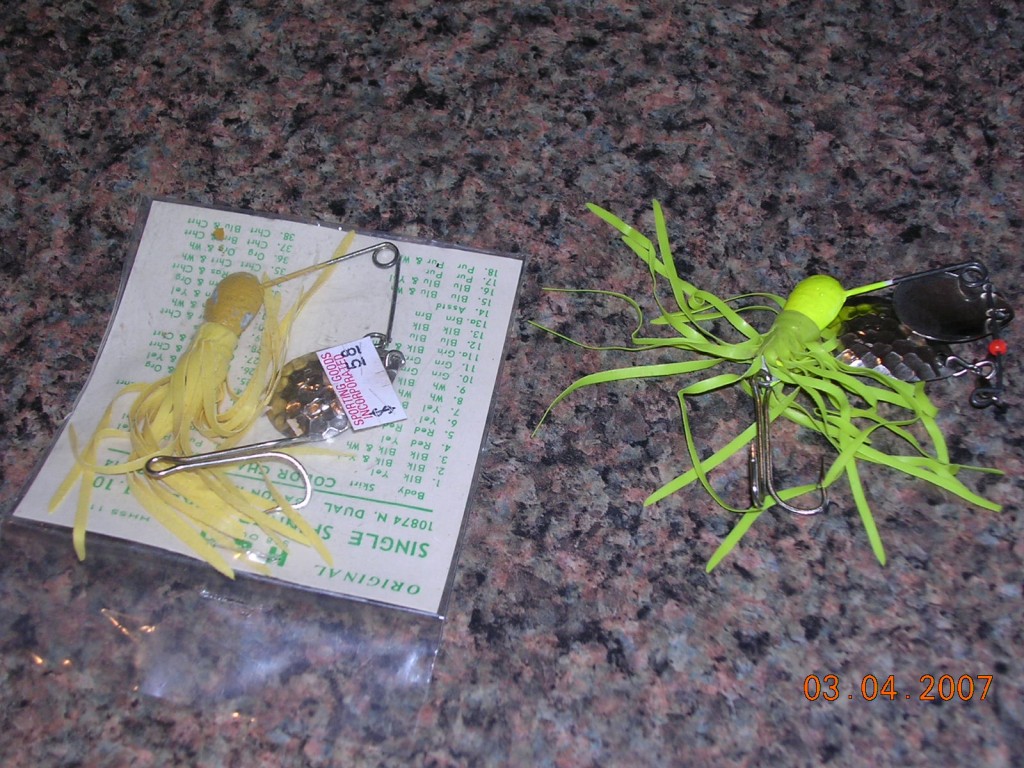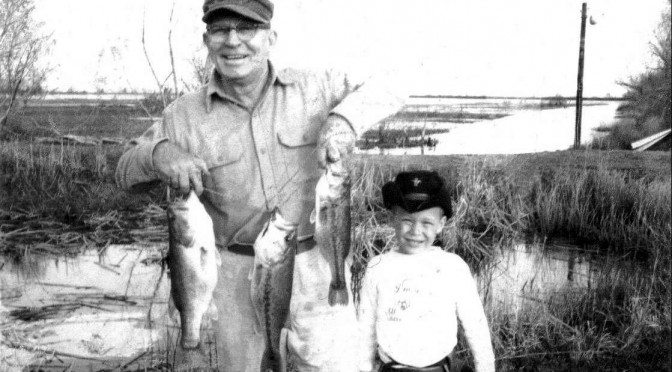The summer of 1964 found me still working multiple jobs with little spare time. My dad had made friends with a Telephone Co. contractor from Philadelphia, Miss. Looking back now I can see that he was a “redneck’s, redneck”. He was a market hunter for ducks in the fall, had absolutely no respect for game laws, but he was the man who had introduced us to The Trinity River bottom.
In past years he had spent time in north Louisiana and had made several successful float trips down the head waters of the Calcasieu River. Easy trips of four to six hours, floating and fishing about five miles of river. Put in and take out at State boat ramps. Easy, no problem. The object of these trips was to catch Smallmouth Bass not really the cold water variety but Spotted Bass, common to moving water in the south and southwest.
My Dad, who was nearing retirement, and I had arranged for a weekend off in mid September, so off we go to north Louisiana. Our “headquarters” was a motel in Alexandria and we arrived at the jumping off point at first light on a bright, clear, Indian Summer day. Four of us were going on the float trip, my Dad and I in one jon boat and his contractor friend and one of his relatives, who “knew the river” and would “guide” us, in the other boat. His relative saying “We got a few falls (fallen trees spanning or down in the river) to go over or under, but outside of that, it will be easy. I have since learned that if I hear the word, easy, prepare for the worst.
Where we put in, the Calcasieu River was slow moving, clear as tap water, about seventy-five feet wide and for our whole trip didn’t exceed that width. The banks were lined with tall pine and oak trees. Pretty. Pretty now, but we all would be cursing them by midnight!
We drift about fifty yards from the boat ramp, I put a hand full of Beechnut chewing tobacco in the side of my mouth, and my first cast with a yellow Piggy Boat and, bam, a solid strike from a one pound spotted bass, the fish is taking line, running, not jumping like a regular bass. My dad hooks up and soon we have two nice bass on our stringer. Looks like a good day starting. I’ll ask myself later “Why did we keep these bass?”
We ease under our first fall, a tree down from bank to bank, and up ahead we see one resting in the water. We drift up to it and, in the water we go, and pull the jon boat over it. The little “dip” was refreshing. This is repeated several times during the first half-mile of our “easy” float. We come to hundred yard stretch with no falls and casting right up to the bank, retrieving for two reel cranks, I have a savage strike. This fish is fighting hard, running and now jumping. What a pretty sight. I land him and onto the stringer he goes, a four-pound Spotted Bass! My dad takes another and we are amassing a really good stringer of fish.
More falls, it seems one every thirty or forty yards. It is now noon and I bet in the last four plus hours, we haven’t made two miles. I ask the relative and he says, “A few more falls than I remember, but we don’t have that far to go.” Later I think, “Who is this guy who supposedly knows the river?”
The fishing remains great! Whenever we can we make a cast, at least half of them are rewarded with a solid hit. However, it seems we are spending more time slipping under or pulling over trees, than fishing. We catch several more nice, three and four pound bass. Our stringer is getting heavy. We slip under a fall and blankety-blank, my dad lets out a line “blue streakers”, and slaps the top of his head, smushing a red wasp which has popped him. Over he goes into the water and I think, “Oh no, he’s had a heart attack,” but he comes up out of the water smiling and says, “Boy, when wasps get after you, it’s better to go into the water than run.” As if he could have run anywhere. He asks for my chew of tobacco and places it on the sting and soon the sting just a memory.
More falls! Over them, under them, drag the boat, we’re both soaked, so are our other fishing mates, it’s close to 5:00 PM and no relief in sight! The intrepid relative says, “There sure is a lot of these falls!” We echo his sentiments!
Here is something new, two trees down at the same place, a longer drag, almost a portage. My Dad jumps onto the logs pulling the boat sideways so I can also get out. We pull the bow of the boat up on the logs and he jumps into the water and the water explodes! He has jumped down on to an Alligator! Ride ‘em cowboy! “Alligator, look out!” the fearless relative shouts. A six foot ‘gator is airborne as my Dad scrambles back up onto the logs. The ‘gator is long gone but here come the “blue streakers”, blankety-blank-blank, from my Dad. He is soaking, again, really mad and ready to choke our “guide”, the relative. He says in a firm voice, “Get me out of this blankety-blank place. The relative says, “We still got a ways to go.”
He was right, it’s nearly dark and we seem no closer to the take out ramp than we were two hours ago. Something is wrong here. We pull over to the side and ask the relative, what’s the deal. He replies, “Best I can figure, the hurricane that came through here last year just tore up these woods and knocked all of these trees down. But don’t worry it’s an easy walk out’a here.” There’s that word, easy, again.
At near dark, probably 7:00 PM, we tie up the boats to a convenient (they are all convenient) fall. The “relative” can worry about his boats later. We start “out”, carrying our rods, luckily we didn’t bring any tackle boxes, fish on the stringers and water, today’s lunch being all gone. Our “guide”, the relative leads off. We guess we have to walk two to three miles to the road, then north on the road for another mile to the State ramp and our vehicles.
The darkening sky finds us walking somewhat north, through very thick underbrush and trees everywhere, carrying our rods, the stringer of fish and our water. Down and up through a dry creek bed and slipping down the “up side” of the bank I remark “This is more like a forced march than an easy walk.” No reply from our “guide”.
We trudge on for an hour and go down a creek bank and climb up the other side and I see my slide marks. We have walked in a circle! “Stop” I cry out and our weary procession slows to a halt. “We’ve walked in a circle”, showing them my slide marks. I say, “This deal stops right now and I’m walking in front and am going to get us out of this damn place!” I look to the sky and find the Big Dipper and follow its bottom two stars to the North Star. That will be my mark to keep us on line. Our “guide” is silent.
With me in the lead we head north. After about another hour we all decide to drop our stringers of fish and leave them for the varmints. Why did we keep those fish? We finish the water and drop the water bags to the ground. Pressing on, we hear the artillery at Ft. Polk, north of us, begin booming. I think, “The booming will be a good guide.”
As we head north we see a light ahead, six hundred yards later it turns out to be a Coleman Lantern hanging in a tree. We see three men sitting around a low fire. “Hello, the camp!” I exclaim. The three men jump up, startled, and look around. Seeing us, four apparitions coming out of the dark with no lamps or flashlights, out comes their guns!
“Stop right there, who are you.” We explain our plight, still standing outside of the circle of light and finally our “guide” remarks that he is the brother in law of “so-in-so” a deputy sheriff. The guns comes down and they ask, “What do you want.” I reply, “A drink of water and a ride to our cars parked at the State ramp.” Mumbled conversation and a reply, “Pay for the gas and we’ll take you to your car, but no water.” “Thanks” I say, then mumbling under my breath, “You sons of bitches!”
Back at our cars, my Dad’s contractor friend is quiet, not having said much for the last six or seven hours and his relative, our “guide, only says “It was a tougher float than I thought it would be.” Saying our good byes, Daddy and I got into his car. He looks at his watch and says, “It’s almost midnight. Quite a day!” I rolled down the window, and fished out a Pall Mall and lit up, blowing the smoke out of the window. My Dad had smoked for forty years but had quit smoking ten years past and hated for me to smoke. He said to me, “Boy give me one of those.” I never saw my Dad’s contractor friend again. And, I never saw my Dad smoke another cigarette.






